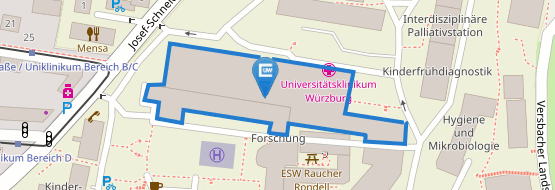Prof. Dr. Emmanuel Saliba
Research
The ability of pathogens to subvert host cells for survival or replication is in part due to their astonishing capacity to adopt different lifestyles. Characterizing and understanding infected cells at single-cell level resolution using genome-wide transcriptome analysis, in combination with in vivo models and tissue engineering, are a powerful approach to understand the heterogeneity inherent to the infection process. These approaches also have the potential to decipher the host-pathogen microenvironment and ultimately resolve the impact of individual infection foci on the disease progression with unprecedented resolution. By studying Salmonella Typhimurium and respiratory viruses as model pathogens, we develop quantitative methods based on single-cell transcriptomics to track the physiological features of every individual pathogen in space and time in association with its host and to reconstitute the three-dimensional environment of infection foci.
Wendisch D, Dietrich O, Mari T, von Stillfried S, Ibarra IL, Mittermaier M, ..., Ochs M, Eils R, Müller-Redetzky H, Hauser AE, Luecken MD, Theis FJ, Conrad C, Wolff T, Boor P, Selbach M, Saliba AE#, Sander LE# (2021)
SARS-CoV-2 infection triggers profibrotic macrophage responses and lung fibrosis
Cell 184(26):6243-6261.e27
#corresponding authors
Imdahl F, Vafadarnejad E, Homberger, C, Saliba AE#, Vogel J# (2020)
Single-cell RNA-sequencing reports growth-condition-specific global trans-criptomes of individual bacteria
Nature Microbiology 5(10):1202-1206
#corresponding authors
Schulte-Schrepping J, Reusch N, Paclik D, Baßler K, ..., Schultze JL, Aschenbrenner AC, Li Y, Nattermann J, Sawitzki B, Saliba AE, Sander LE, Deutsche COVID-19 OMICS Initiative (DeCOI) (2020)
Severe COVID-19 is marked by a dysregulated myeloid cell compartment
Cell 182(6):1419-1440.e23
Publikationen chronologisch (pdf)
![[Translate to Englisch:] [Translate to Englisch:]](/fileadmin/_processed_/a/1/csm_Saliba_Antoine-Emmanuel_c_HIRI_Nik_Schoelzel_709c2e9fd6.jpg)
![[Translate to Englisch:] [Translate to Englisch:]](/fileadmin/_processed_/8/0/csm_Beste_Tristan_c_HIRI_Nik_Schoelzel_31826467e8.jpg)


![[Translate to Englisch:] [Translate to Englisch:]](/fileadmin/_processed_/e/1/csm_Chiggiato_Lisa_c_HIRI_Nik_Schoelzel_964d289e19.jpg)
![[Translate to Englisch:] [Translate to Englisch:]](/fileadmin/_processed_/1/c/csm_Chou_Chia-Ling_c_HIRI_Nik_Schoelzel_e5edb66eb5.jpg)
![[Translate to Englisch:] [Translate to Englisch:]](/fileadmin/_processed_/8/3/csm_DiFabion_Nina_c_HIRI_Nik_Schoelzel_568d289984.jpg)

![[Translate to Englisch:] [Translate to Englisch:]](/fileadmin/_processed_/7/a/csm_Leipold_Alexander_c_HIRI_Nik_Schoelzel_2dba5b18bc.jpg)
![[Translate to Englisch:] [Translate to Englisch:]](/fileadmin/_processed_/d/b/csm_Krammer_Tobias_c_HIRI_Nik_Schoelzel_ab3549bc29.jpg)
![[Translate to Englisch:] [Translate to Englisch:]](/fileadmin/_processed_/e/1/csm_Toussaint_Christophe_c_HIRI_Nik_Schoelzel_01a7bf39f1.jpg)



